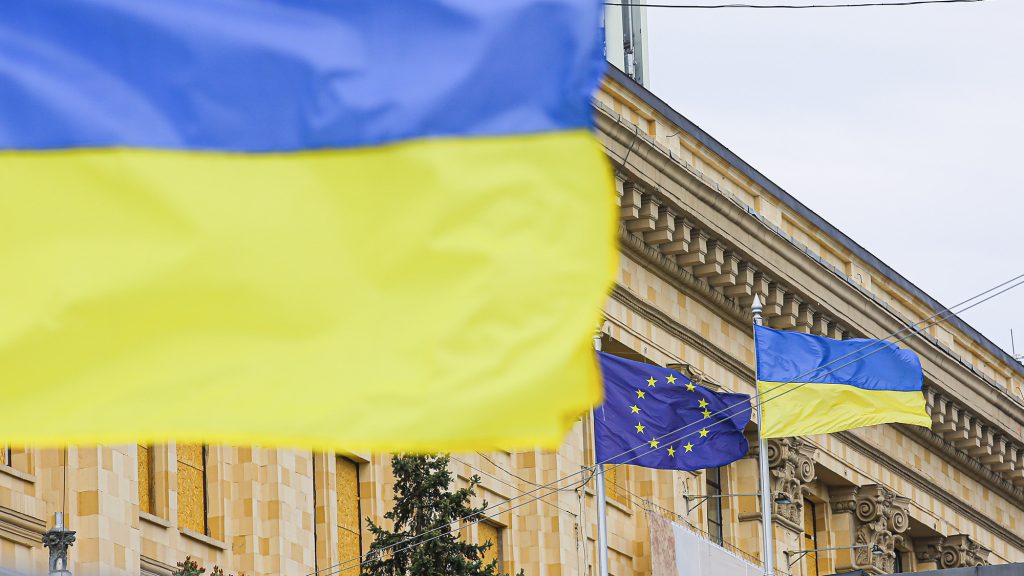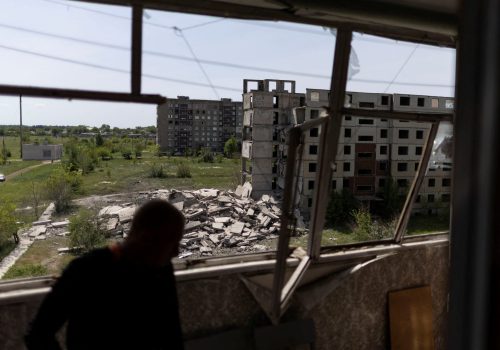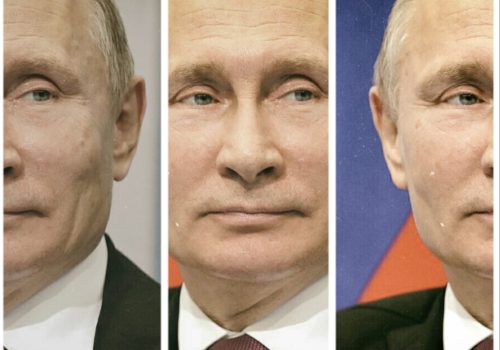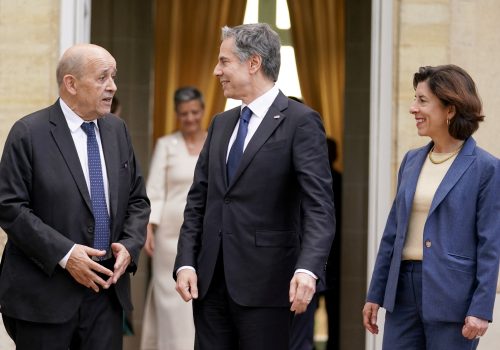Relying on help from its allies and partners, Ukraine has proven itself remarkably resilient as Russia’s war enters its fourth month. But short-term military assistance is one matter—and long-term political backing is entirely another.
With Kyiv holding off the Kremlin’s troops on the battlefield, the focus is increasingly falling on its bid for European Union (EU) candidacy, submitted just days after Russia’s invasion began. From May 30 to 31, a special meeting of the European Council will focus on issues related to the war, followed by a summit next month during which EU member states are expected to discuss Kyiv’s potential membership in the bloc.
From Paris to Warsaw, the Atlantic Council’s experts have kept their ear to the ground for chatter in Europe’s capitals about whether Ukraine has a fighting chance to join this elite club of nations.
Jump to an expert reaction from…
- Paris: Thinking realistically?
- Berlin: Expectation management
- Warsaw: Personal interests
- Prague: Common cause
- London: The limits of friendship
The buzz in Paris: Thinking realistically?
To say the least, French President Emmanuel Macron’s recent proposal to create a “European political community” triggered mixed feelings across Europe (including in Ukraine), mainly because it is perceived as an alternative to Ukraine joining the EU.
There are several reasons driving Macron’s thinking. First, France is being careful not to deceive Ukraine by making promises that EU member states cannot keep. The risk of being counterproductive here is great: There is strong political will in Ukraine to join the bloc, and falsely promising a quick membership is likely to damage this aspiration in the coming years, as the path to membership is necessarily long.
Second, France—along with many other European countries—is well aware that this process is indeed a demanding and long one, and there is no appetite in Paris for fast-tracking it. This is especially true considering that the six Western Balkan countries are also in various stages of candidacy, that there is still a need for Ukraine to implement tough but necessary reforms, and that the EU itself lacks the capacity to absorb a new member without internal reform of its own.
The proposal for a European political community offers concrete and more immediate benefits through closer cooperation with bloc members. This can include greater political coordination with the EU and/or deepening economic ties, thereby facilitating the completion of the objectives of the accession process in parallel to existing EU structures. Therefore, this community is meant to be complementary—not an alternative—to EU membership.
—Marie Jourdain is a visiting fellow at the Atlantic Council’s Europe Center.
The buzz in Berlin: Expectation management
Media coverage of the upcoming European Council special meeting will likely focus on whether Hungarian Prime Minister Viktor Orbán will be able to keep language about a sixth sanctions package against Russia out of the final communiqué. Less noticed will be the absence of any movement on the question of whether Ukraine will be granted candidate status for EU accession any time soon. That question will merely be “considered” at the June 23-24 summit.
On this, the German government has increasingly tried to manage Ukrainian expectations. During the initial weeks and months of Russia’s war against Ukraine, policymakers, like many of their EU colleagues, seemed reluctant to address the likelihood head-on, even as Ukrainian President Volodymyr Zelenskyy called for “immediate accession.” True to Germany’s focus on the internal market as the EU’s core, many merely pointed to the complexity of meeting technical accession requirements as a way of hinting at a “no” to quick progress.
Following President Macron’s speech, German leaders seem to have shifted gears. German Foreign Minister Annalena Baerbock made clear during her May 10 visit to Kyiv that there could be “no shortcut” to membership and the EU should make “no false promises,” even if “Ukraine is an integral part of Europe.” In his immediate reaction to Macron’s proposal for a “European political community,” German Chancellor Olaf Scholz cautiously welcomed the initiative—but also rejected fast-tracking for Kyiv and urged that the countries of the Western Balkans must not be bypassed on their path of full membership. All but explicitly uttered by Scholz: Ukraine should not hold its breath expecting quick progress toward full membership.
—Jörn Fleck is the deputy director of the Europe Center.
The buzz in Warsaw: Personal interests
As a country that has played a leading role in providing assistance to Ukraine and offering a haven for more than 3.5 million refugees, Poland has often spoken of the need to make another war like this impossible. Warsaw sees EU enlargement as a method of pushing back against Russian imperialism and opposes any kind of “permanent waiting room” for Ukraine, or some kind of “EU-lite” solution. Ultimately, Poland supports Ukrainian membership in NATO and sees the EU as another step toward integrating Ukraine into the West.
When Polish President Andrzej Duda addressed Ukraine’s parliament this week, he delivered a clear statement: He “personally will not rest until Ukraine becomes a member of the European Union in the full sense of the word.” He followed that up by expressing support for “an express path for Ukraine’s membership of the EU,” and that Ukraine should have access to EU funds for reconstruction.
It was not the first time the idea was floated by Polish officials. As early as the beginning of March, Poland’s lower house of parliament passed a resolution calling for Ukraine to receive candidate status and prepare a roadmap for accession negotiations.
Despite the political polarization in Poland, the issue of Ukraine’s potential accession to the EU seems to garner broad public support—even from opponents of the current government. The reasons for this are simple: Poland views a stable, Western-oriented Ukraine as vital to its national-security interests, especially given the many issues it has faced lately with the Alyaksandr Lukashenka regime in neighboring Belarus. The current Polish government also sees this as an opportunity for Warsaw to play a leading role in the region and improve its standing within the EU itself.
—Aaron Korewa is the director of the Atlantic Council’s Warsaw office.
The buzz in Prague: Common cause
Russia’s aggression against Ukraine should be perceived as part of a broader Kremlin assault against EU enlargement. For this reason, it is essential that the bloc keeps its door open for Ukraine. History indicates that Vladimir Putin’s Russia will always be tempted to fill its periphery with proxies. EU enlargement, even beyond Ukraine, is also about containing Moscow’s imperial lust.
In this week’s special meeting, the European Council is expected to deal with Ukraine’s reconstruction and is not yet aiming to discuss the country’s future with the EU. But the two topics are related: If Europe is about to invest in Ukraine on such a scale, it is better to do so within the framework of Ukraine’s possible membership in order to guarantee that EU funds will be properly allocated.
If all goes well, the European Council will discuss Ukraine’s candidacy status in June. It is not a secret that all EU member states are not yet fully on board; rather, those that have suffered under the Soviet yoke and have a better grasp of Russia’s policies are the ones that are the most supportive of Ukraine’s ambitions. That is why it is up to them to convince the others. It is about keeping the door open and not ceding to Putin’s pressure—knowing that the way to full EU membership would be a long and open-ended process.
—Petr Tůma is a visiting fellow at the Europe Center.
The buzz in London: The limits of friendship
When it comes to military aid and intelligence support, Ukraine’s strongest European supporter has been the United Kingdom. Prime Minister Boris Johnson has become something of a folk hero in Ukraine, much to the surprise of most of his fellow countrymen.
But when it comes to helping deliver what Ukraine truly wants geopolitically, post-Brexit Britain is not exactly helpful: Standing outside the EU, it is in the awkward position of wanting Kyiv to join a club it has now left, having abdicated all influence over the process of accession. While the crisis in Ukraine has mostly revealed Britain’s capacity to act and still influence the European security order, the matter of Ukraine’s ultimate aspiration shows the clear limits to that.
Still, London and Kyiv’s futures are linked. Macron’s “European political community,” open to countries that have both left the EU and countries whose accessions he believes will take decades, is aimed at Britain and Ukraine, respectively. Whether both countries, which assisted each other in the run-up to war for mutual strategic benefit, will be able to jointly respond to such an opening—or present their own visions—will be an issue to watch. These big-picture questions have indeed already been debated (if only vaguely) by British and Ukrainian officials.
—Ben Judah is a senior fellow at the Europe Center.
Further reading
Thu, May 26, 2022
Three possible futures for a frozen conflict in Ukraine
New Atlanticist By Mathew Burrows, Robert A. Manning
As the war in Ukraine grinds on, our experts lay out several scenarios that could reshape the world.
Tue, May 24, 2022
The Putin puzzle: Why is the Russian dictator so obsessed with Ukraine?
UkraineAlert By
Vladimir Putin has sought to justify his invasion of Ukraine by claiming the country has no right to exist but in reality modern Ukraine enjoys a level of democratic legitimacy that far exceeds his own authoritarian regime.
Thu, May 19, 2022
Russian aggression brings EU and US together on trade and tech in France. What comes next?
New Atlanticist By
Our experts break down the US-EU Trade and Technology Council meeting and what it means for the future of transatlantic tech and trade policy.
Image: Ukrainian and EU flags in front of the Kharkiv Regional Government headquarters in the center of Kharkiv. Russia invaded Ukraine on 24 February 2022, triggering the largest military attack in Europe since World War II. Photo via Aziz Karimov/SOPA Images/Sipa USA and Reuters.



